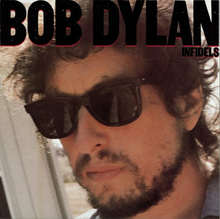Infidels (Bob Dylan album)
| Infidels | ||||
|---|---|---|---|---|
 |
||||
| Studio album by Bob Dylan | ||||
| Released | October 27, 1983 | |||
| Recorded | April–May 1983 at the Power Station, New York | |||
| Genre | Heartland rock | |||
| Length | 41:39 | |||
| Label | Columbia | |||
| Producer | Bob Dylan, Mark Knopfler | |||
| Bob Dylan chronology | ||||
|
||||
| Professional ratings | |
|---|---|
| Review scores | |
| Source | Rating |
| AllMusic |
|
| Robert Christgau | B- |
| Entertainment Weekly | A- |
| MusicHound | |
| Paste | (Positive) |
| Rolling Stone | |
Infidels is the twenty-second studio album by American singer-songwriter Bob Dylan, released on October 27, 1983 by Columbia Records.
Produced by Mark Knopfler and Dylan himself, Infidels is seen as his return to secular music, following a conversion to Christianity, three evangelical, gospel records and a subsequent return to a less religious lifestyle. Though he has never abandoned religious imagery, Infidels gained much attention for its focus on more personal themes of love and loss, in addition to commentary on the environment and geopolitics. Christopher Connelly of Rolling Stone called those gospel albums just prior to Infidels "lifeless", and saw Infidels as making Bob Dylan's career viable again. According to Connelly and others, Infidels is Dylan's best poetic and melodic work since Blood on the Tracks.
The critical reaction was the strongest for Dylan in years, almost universally hailed for its songwriting and performances. The album also fared well commercially, reaching #20 in the US and going gold, and #9 in the UK. Still, many fans and critics were disappointed that several songs were inexplicably cut from the album just prior to mastering—primarily "Blind Willie McTell", considered a career highlight by many critics, and not officially released until it appeared on The Bootleg Series Volume III eight years later.
Infidels was produced by Mark Knopfler, best known as the frontman of the band Dire Straits. Dylan initially wanted to produce the album himself, but feeling that technology had passed him by, he approached a number of contemporary artists who were more at home in a modern recording studio. David Bowie, Frank Zappa, and Elvis Costello were all approached before Dylan hired Knopfler.
...
Wikipedia
